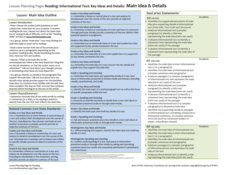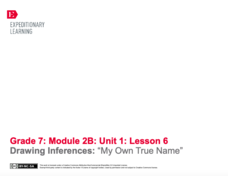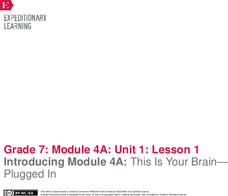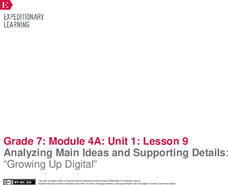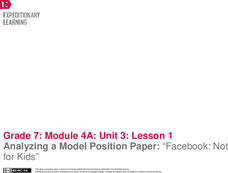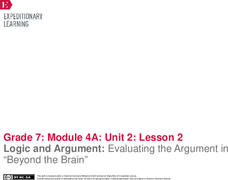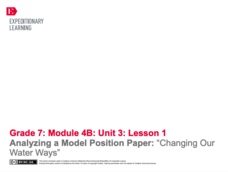For the Teachers
Main Idea Outline
Find the main idea in an informational text with a versatile lesson. Three levels of differentiation help you implement the strategy in any age or class level, based on the ability and objectives of your learners.
Polk Bros Foundation
Science Learning Summary Guide
Apply reading standards to your science curriculum by asking pupils to complete this guide. Individuals note down important vocabulary as well as two ideas they learned and two supporting facts for each idea. They then take this...
Pearson
Main Idea
The main idea of this resource is that you should take a look if you're planning to teach main ideas in your class! Cover just about everything you need to know about main ideas with a packet of materials that includes information and...
Scholastic
Prescription Pain Medication: What You Need to Know
The national epidemic of opioid addiction is making its way into high school populations. Educate the students in your class about the ways prescription opioids can both block pain and deliver large amounts of dopamine that make it very...
Curated OER
Researching the Past
Learners research the western movement in order to learn note taking strategies with nonfiction texts. They use the Internet to search for important information about the western movement using the Cornell Notes note-taking system. They...
Polk Bros Foundation
Comprehensive Nonfiction Reading Questions
Analyze any nonfiction text with the set of questions on this sheet. Class members practice inferring by noting the main idea and purpose of a passage. They also analyze an opinion in the passage and write a brief summary. See the...
Making Evidence-Based Claims: Grade 7
New ReviewThe most effective way to support an argument is with clear and relevant evidence. As seventh graders read and listen to Cesar Chavez's California Commonwealth Club Address, they work through five sections of a textual analysis unit,...
Fluence Learning
Writing Informative Text: Did Shakespeare Write Shakespeare?
William Shakespeare penned some of the richest and most fascinating works of literature—or did he? Middle schoolers read three brief informative passages and conduct additional research to evaluate the claim that Shakespeare did not...
EngageNY
Launching the Module: Identity and Transformation, Then and Now
Identify yourself! Learners listen to Nadia’s Hands read aloud before working in their identity journals to answer prompts relating to the story. They then look at identity using two recording forms Who Am I on the Outside? and Who Am I...
EngageNY
Defining Key Terms: Gender and Internal Identity
Be a team player! Learners examine the article Team Players and discuss how the title might relate to identity. They then analyze the article using the sheets Reader’s Notes: Team Players and Text-Dependent Questions: Team Players....
EngageNY
Mid-Unit Assessment: Evidence, Ideas, and Interactions in “Why Couldn’t Snow White Be Chinese?”
The class is halfway there! Pupils complete a mid-unit assessment by answering questions in Evidence, Ideas, and Interactions in Why Couldn’t Snow White Be Chinese? Readers then work with partners to analyze the 2010 Census: United...
EngageNY
Drawing Inferences: “My Own True Name”sl.7.1
How much are you worth? Scholars read text dependent questions, and discuss how the text relates to self worth. They then work with partners by having written conversation to make inferences about the text. For homework, pupils correct...
EngageNY
Reading Closely: Introducing Chávez’s Commonwealth Club Address and Considering the Plight of the Farmworker
How can a persuasive speech help inspire social change? Scholars read along as they listen to the first half of César Chávez's 1984 speech, "Commonwealth Club Address." Next, pupils use graphic organizers to analyze one of Chávez's...
EngageNY
Introducing Module 4A: This Is Your Brain—Plugged In
What does brain science reveal about teens and decision making? Scholars watch a short video and participate in a gallery walk to pique their interest and curiosity about the topic. Next, they begin reading an informational article about...
EngageNY
Identifying Main Ideas and Supporting Details: What’s Going On in the Teenage Brain?
What's going on in the teen brain? Pupils consider the question as they continue reading an informational article about the topic. While reading, they use a Thinking Log worksheet and an anchor chart to track their understanding of...
EngageNY
Analyzing Main Ideas and Supporting Details: “Growing Up Digital”
Young scholars continue their exploration of adolescent brain development by reading an informational text, "Growing Up Digital," by Matt Richtel. Then, with partners, they complete note-catcher worksheets to capture the article's main...
EngageNY
End of Unit Assessment: Analyzing an Informational Text
Scholars wrap up the unit by taking an assessment and reading the informational text "You Trouble" by Justin O'Neill. As they read, they answer multiple-choice questions and complete charts to analyze the main idea and supporting details...
EngageNY
Reflecting on Douglass’s Narrative
The conclusion of Narrative of the Life of Frederick Douglass comes to life in a reader's theater. The class discusses the use of quotation marks in the text and then divides parts among the groups. After the performances, groups...
EngageNY
Analyzing a Model Position Paper: “Facebook: Not for Kids”
It's time to take a position! Scholars learn to write a position paper by analyzing a model paper titled Facebook: Not for Kids. After studying the model paper, learners think about their own papers using the Position Paper Planner. They...
EngageNY
Logic and Argument: Evaluating the Argument in “Beyond the Brain”
The brain is not the mind. Scholars explore the claim by reading an informational article about neuroscience research, "Beyond the Brain." As they read, they answer text-dependent questions and complete an anchor chart to evaluate...
EngageNY
Analyzing Main Ideas and Details: Why Care about Water?
Pay attention to details! After completing text-dependent questions about paragraphs 10-12 of "Water is Life," scholars view the video "Why Care about Water. "They view the video three times and use a Main Idea and Details note-catcher...
EngageNY
Analyzing a Model Position Paper: “Changing Our Water Ways”
Follow the leader for better writing! Scholars analyze a model position paper, "Changing Our Water Ways." During the first pass, they listen as the teacher reads the paper aloud. They then do a second read of the paper and complete a...
Curated OER
Voices from Little Rock: Understanding the Civil Rights Movement through Primary Sources
As part of a study of the Civil Rights Movement, class members examine documents associated with the Little Rock Nine, the Brown v. Board of Education ruling, the 14th and 15th Amendments to the US Constitution, and chapters from Melba...
Teacher Printables
Just the Facts
Show your class how fascinating a text can be by asking them to focus on interesting facts they learned while reading. There are boxes for six facts as well as one large box where pupils can record the most important fact from their...
Other popular searches
- Central America
- Central Tendency
- Central America History
- Measures of Central Tendency
- Central Banking
- Central American History
- Central Nervous System
- Central Idea
- Central Asia Geography
- Measure of Central Tendency
- Central Angle
- Central Africa


